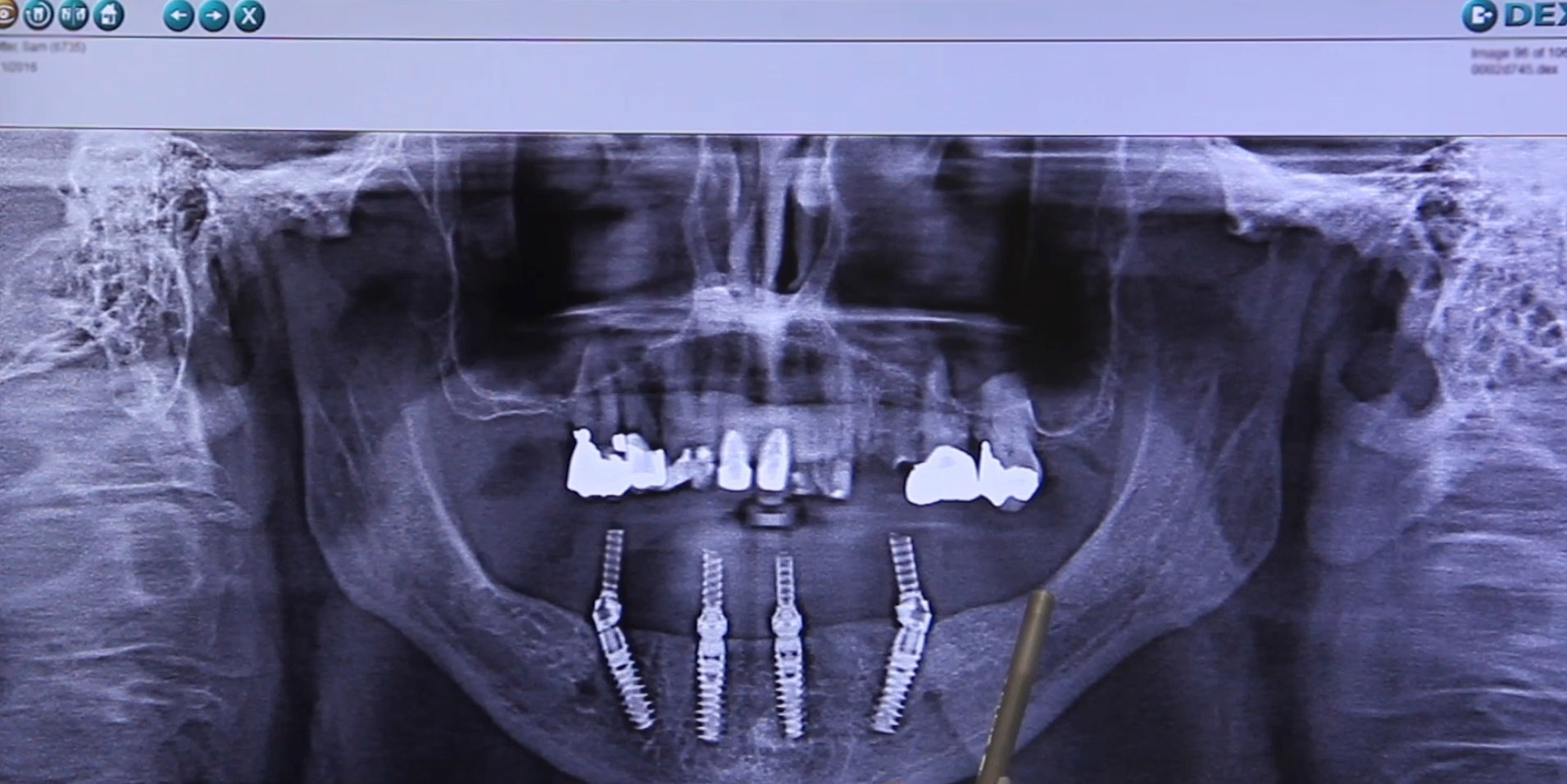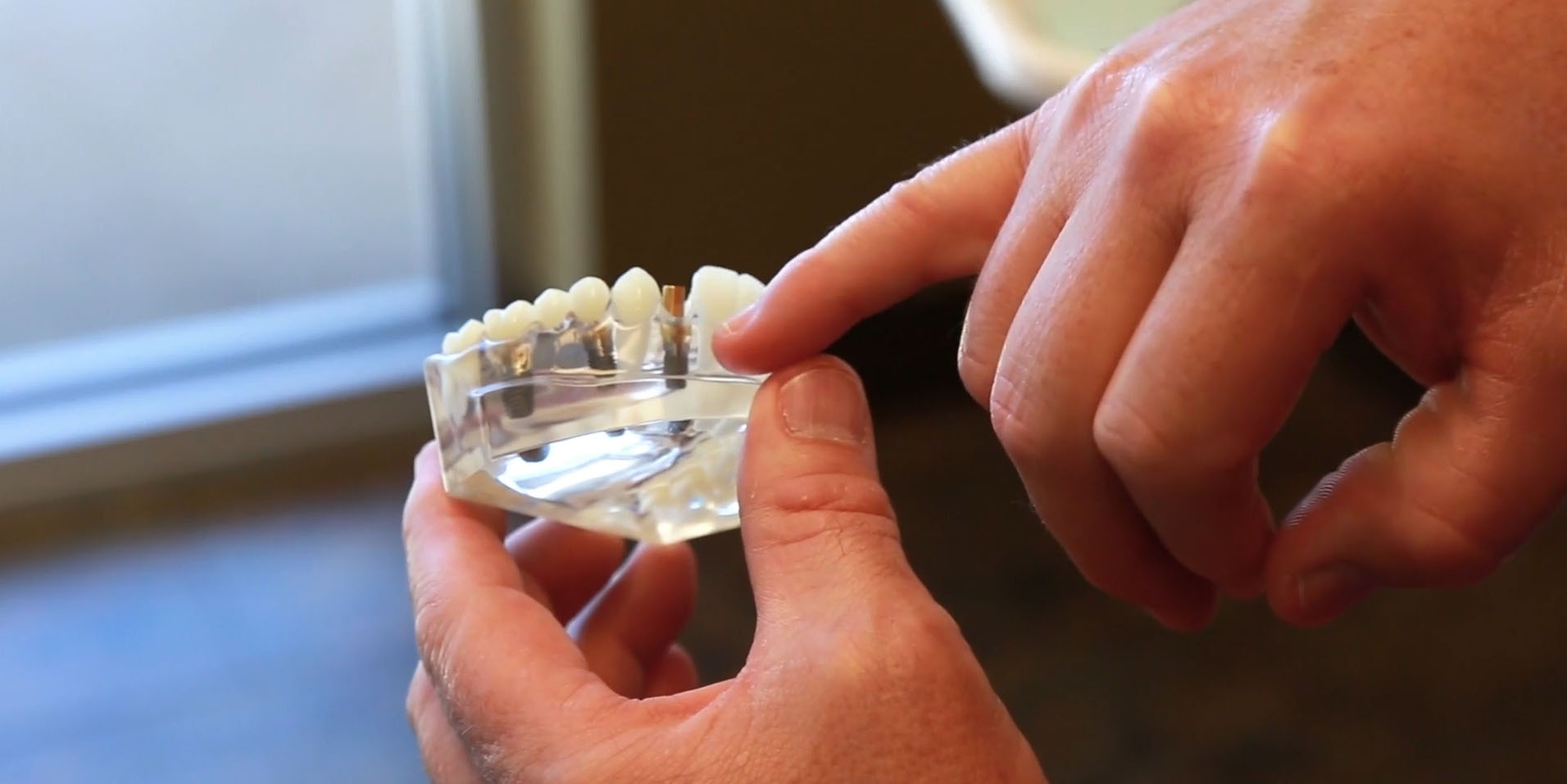The Dental Implant Process
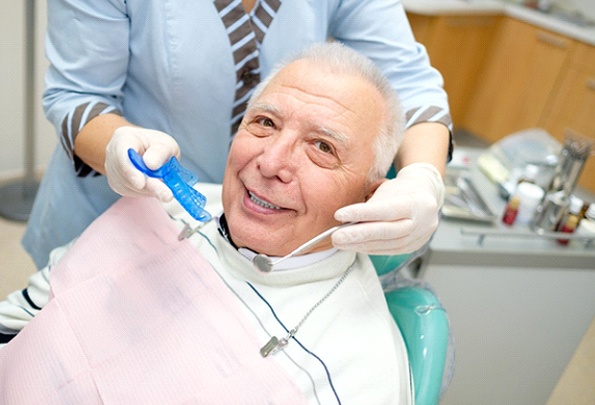
Dental implant treatment consists of multiple phases, making it possible to replace teeth fully and make your smile complete. Each phase plays a crucial role in the longevity of your new tooth, and Dr. Kaopua is happy to discuss each step of treatment with you in great detail during your consultation so you can feel comfortable about your future care. In the meantime, feel free to read through the process on our website and give us a call directly if you have additional questions!
Learn More
Initial Dental Implant Consultation
Before we can place dental implants, we need to make sure that the treatment is the best option for your smile. During this appointment, Dr. Kaopua will examine your smile, evaluate the current state of your oral health, and then make a recommendation from there. If you need additional bone tissue for the implant to integrate properly, we may suggest a bone graft. Alternatively, existing tooth decay or gum disease will need treatment before any oral surgery can take place.
Dental Implant Surgery
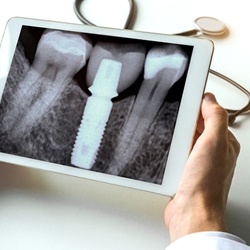
In some dental offices, the dentist works with an implant specialist to have the surgical portion of your procedure performed outside of the practice. At Albright Family Dental, not only can you get your implant restored, but you can get it placed all in the same location. We believe that by expanding our accommodations at the dental office, your implant treatment feels more convenient and your needs can be more effectively communicated.
During surgery, a small incision is created inside the gum tissue so that a tiny hole can be made in the jawbone. After that hole is created, we will carefully place the implant and then close the gum tissue with stitches. This will protect the implant as it begins to fuse with your bone. If we decide to perform a bone graft, we will perform this step ahead of placing the implant.
Dental Implant Osseointegration & Abutment
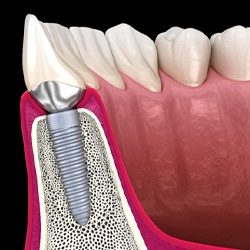
Over the next several months (typically about four to six), the implant will slowly fuse with the bone. This process is known as osseointegration and it’s one of the most important phases of your tooth replacement process. Thanks to the titanium implant’s biocompatible properties, it can fuse inside the jaw without worry of being rejected. While it is a slow process, it’s what allows dental implants to last for decades on end (and for life) when properly taken care of.
When the fusion is complete, you’ll come back to our office to have an abutment attached to the implant. This metal connector is designed to provide stability to the final restoration.
Delivery of Dental Implant Restoration(s)

Ahead of the final placement of your restoration, we’ll capture impressions of your mouth so we can create the crown, bridge, or denture that will eventually be attached. A couple weeks later, you’ll come back to our office to have it placed and we’ll make adjustments if necessary to ensure your bite is even and feels natural.
Benefits of Dental Implants
When you replace the entire root structure of teeth, not just the crown portion, you’re doing truly incredible things for your long-term smile and oral health. Dental implants offer far more than any other tooth replacement solution and make it possible to maintain a happier, healthier smile for longer. With more than 5 million dental implants placed each year in the U.S. according to the American Dental Association (ADA), it’s no wonder so many people are embracing the benefits of dental implants in Everett! If you want to be a part of this growing number of satisfied individuals, take a look at the advantages listed below and schedule an appointment to see our team today!
Learn More
Day-to-Day Benefits

-
Better oral health – Instead of worrying about how your prosthetic may or may not impact your oral health, dental implants make it possible to easily clean and maintain your smile. Because they look and feel like regular teeth, you’ll be able to maneuver around your prosthetic and adequately clean your gums and teeth to minimize your risk for decay and gum disease.
-
Greater strength and functionality – Unlike dentures that can easily slip or fall out while eating, dental implants in Everett make it possible to eat the foods your love with confidence. No matter the texture, you can be free to enjoy your favorite meals because of your increased bite force and chewing power.
-
More youthful appearance - Replacing the root encourages blood flow to the soft tissues in your mouth. This means that nutrients essential to your oral health can more easily travel to your mouth and keep your skin looking youthful.
Health Benefits

-
Healthy teeth remain in place – Once you lose one or more teeth, your remaining, healthy ones will try to shift to close the gap. By having dental implants placed, you can avoid dental drift and the possibility of orthodontic treatment later on.
-
Improved jawbone stimulation - The titanium root stimulates your bone tissue, making sure that your biting force stays strong.
-
Your healthy teeth remain untouched – There is no need to alter your healthy adjacent teeth with dental implants. Unlike a dental bridge that requires those teeth on either side of the gap to be filed down to serve as anchors, this is not necessary with permanent prosthetics.
-
Longer Life – According to DentalHealth.org, individuals with 20 teeth or more by the age of 70 had a considerably higher chance of living longer than people with less than 20 teeth. By choosing to replace your missing teeth with dental implants, you can minimize your risk for osteoporosis, heart disease, and even diabetes, all of which can contribute to a shorter lifespan.
Long-Term Benefits

-
Success rate – Upon initial placement by a trusted implant dentist in Everett, you can expect your dental implant success rate to be about 95%. After 10 years, this number ranges between 90-95%!
-
A longer-lasting smile - There are no other tooth replacements that carry the same longevity as dental implants. On average, they last between 25 years and a lifetime, which is a stark contrast to dental bridges (avg. 10-15 yrs.) and dentures (7-10 yrs.)
-
Saving money - You’ll have lower costs overall because you’re not having to worry about maintaining your prosthetics every few years or purchasing added supplies to keep them clean and in place.
Who Dental Implants Can Help
Since dental implants are a highly customized treatment, it can be difficult to say what the cost will be until we’ve had a detailed examination of your mouth. Your needs, whether it’s having multiple dental implants placed or expanding your current bone volume via grafting procedures, will dramatically influence the total cost. Of course, that doesn’t mean your dental implants aren’t a worthwhile investment. Getting your needs nailed down now will ensure that your implant lasts for a very long time, require little maintenance, and fully restore your basic everyday functions.
Learn More
Who Is a Good Candidate for Dental Implants?

Almost any healthy adult can enjoy the benefits of dental implants. Typically, you must have these three things to be considered a good candidate:
-
Good overall health: Because dental implants require a minor procedure, your body has to be well enough to undergo a slight surgery.
-
Great oral health: Problems like tooth decay and gum disease can lead to implant failure, which is why we must address these issues first.
-
Adequate jawbone density: Your jawbone must be strong enough to support dental implants in order for your treatment to be successful.
Even if it doesn’t seem like implants are right for you initially, there is no need to worry. Our dental implant dentist in Everett can provide preliminary treatments like gum disease therapy and bone grafting to ensure the success of your replacement. After we’ve helped get your smile back on track, we can begin your dental implant procedure by creating a treatment plan tailored to the number of teeth that you’re missing.
Missing One Tooth

To replace a single tooth, one titanium implant is paired with a dental crown and an abutment that attaches them together. The abutment also keeps the crown stabilized as you eat your favorite foods. We personalize our crowns for the most natural-looking replacement tooth possible. This is matched to the size, shade, and shape of your remaining teeth so it seamlessly blends in with your smile.
Missing Multiple Teeth

When you need multiple consecutively missing teeth replaced, you can dedicate a pair of dental implants to a single dental bridge. Since the implants are strong enough to hold a bridge, there’s no reason for removing existing tooth enamel to make room for a restoration, which is typical for dental bridges. For multiple teeth missing randomly throughout your smile, we can custom make partial dentures to fill in the gaps like pieces to a puzzle.
Missing All of Your Teeth

By placing a series of dental implants throughout your jaw, typically about four to six, you can replace all the teeth in your arch seamlessly. Implant dentures allow you to enjoy the most stable and strong full smile replacement available. One of the benefits of this solution is that you don’t need a dental implant for every tooth. Instead, we place a minimum number of implants that give you maximum stability.
Learn More About Implant Dentures
For patients facing severe tooth loss and who don’t have adequate jawbone density to support an implant denture, we offer All-On-4 dental implants. This unique method uses four strategically placed dental implants to support an entire full denture in place. Not only could this help you avoid preliminary treatments like a bone graft, but you can also have your new denture place the same day as your dental implants!
Learn More About All-On-4 Dental Implants
Mini Dental Implants

Mini dental implants are significantly smaller and thinner than traditional dental implants. The reason they are smaller is because some patients do not have enough bone material to hold a traditionally-sized dental implant. Mini dental implants integrate with bone tissue more easily, therefore increasing the likelihood that you or a family member can have their smile restored via implants.
Understanding the Cost of Dental Implants

Since they are a highly customized treatment, it can be difficult to say what the cost of dental implants in Everett will be until we’ve performed a detailed examination of your mouth. Your individual needs – whether it’s having multiple dental implants placed or expanding your current jawbone volume via bone grafting procedures – will dramatically influence the total cost. Of course, that doesn’t mean your dental implants aren’t a worthwhile investment. Replacing your missing teeth with implants will ensure that you enjoy a fully functional, beautiful smile for years, if not decades, to come!
Learn More
Preliminary Treatments & Dental Implant Surgery

Many patients suffering from tooth loss are not actually candidates for dental implants right off the bat. If this is the case for you, then you might need to undergo one or more preparatory procedures first, such as bone grafting, gum disease therapy, or tooth extractions. While these treatments lay the foundation for a successful, healthy smile, they do increase your total costs.
On the bright side, you can save money by visiting Albright Family Dental for implant treatment. Because Dr. Kaopua is an implant dentist in Everett who can perform every step of the process in one location, you’re spared the expense of having to travel to – and receive a bill from – a separate office.
The Parts of Your Dental Implant

Naturally, the more implant posts you require, the higher your treatment costs will be. There are also other factors to consider, such as the parts of your dental implant. The posts can be larger or smaller depending on their location in the mouth. The posts and abutments might also be made from different materials and by different manufacturers, which can also influence the price.
Then, there’s the type of restoration that will be placed on top of your implants. A crown that restores a single implant will cost less than a full denture supporting by four to eight implants, as it doesn’t require as much material.
How Dental Implants Pay for Themselves

At first glance, the cost of dental implants can seem intimidating. However, it’s important to remember that you’re making an investment that will pay off in the long run. Dental implants in Everett are more functional and comfortable than other options, so you’ll be improving your confidence, health, and general quality of life.
Better yet, dental implants can potentially save you thousands of dollars over the years! With conventional dentures and bridges, you’ll have to pay for replacements every five to seven years, as well as repairs, adjustments, and maintenance products on a regular basis. In contrast, dental implants should last for several decades, making them a one-time purchase that pays for itself several times over. Not to mention, dental implants promote better oral health, reducing your overall dental care costs.
Does My Dental Insurance Cover Dental Implants?

Most dental insurance plans do NOT cover dental implants, but there may be exceptions. For example, insurance might mitigate the cost of preparatory work or your restoration. We’re in-network with many popular insurance providers, and even if you’re out-of-network, we’ll gladly look over your plan to ensure you’re getting the maximum coverage possible.
Making Dental Implants Affordable

Do you not have dental insurance? Does your plan not provide enough coverage? Don’t worry! We believe that cost shouldn’t stand in the way of attaining a complete smile. That’s why we offer flexible financing options through CareCredit. This company’s low to no-interest payment plans let you fit your dental implant costs into your budget easily!
Advanced Dental Implant Procedures
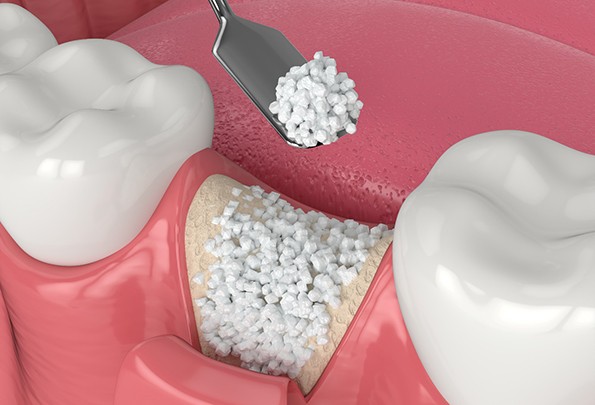
Out of the many treatments available in dentistry, dental implants are among the most complex. However, even before the placement procedure can take place, you may need to undergo other advanced procedures that help ensure successful implants. Many of these consist of strengthening the jawbone so that it integrates securely with the implant posts. Fortunately, Dr. Kaopua has the training and expertise to perform these highly specialized treatments right here in our Everett dental office.
Learn More
Bone Grafting
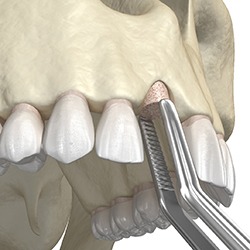
Perhaps you lost your teeth a long time ago. Maybe you have osteoporosis or naturally have low bone density in your jaw. Sometimes, as it is, the jawbone isn’t strong enough to guarantee successful dental implants, which is why we offer bone grafting. The material, taken from another part of your body or from a donor, is positioned in the areas where the implants will go and makes your jawbone more robust and better able to stabilize your replacement teeth.
Sinus Lift
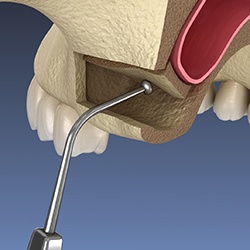
Compared to the lower jaw, the upper jaw tends to have less bone tissue and density because it is so close to the sinus cavity. In fact, the sinus membrane can make bone grafts much more difficult. As a result, we may need to perform a sinus lift, which entails making an incision in the gums, a small hole in the bone, and raising this membrane. Following the sinus lift, we can then add bone grafting material and eventually place implants in this area. It’s important to note that this procedure may add anywhere between 4 and 12 months to the treatment plan to fully recover.
Ridge Expansion
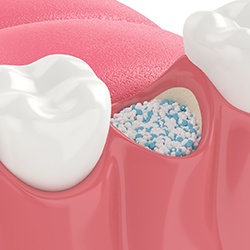
Your jawbone needs to have sufficient width as well as height to hold onto your teeth and any implants. In some cases after tooth loss, the jawbone ridge has become so narrow that there isn’t enough space to place the implants inside, let alone enough bone tissue to support them. A ridge expansion involves putting wedges into the jawbone to widen the ridge and make room for further bone grafts and eventually for the implants to go in the middle.
CBCT Imaging
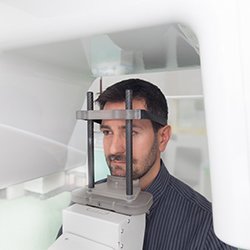
In order to perform any of these advanced procedures, as well as the implant placement itself, Dr. Kaopua needs to know exactly what’s below the gums’ surface. Digital X-rays only show part of the structures needed to accurately plan complex procedures. On the other hand, CBCT scans reveal much more detail, including blood vessels, and create a 3D model of your mouth, which allows Dr. Kaopua to avoid certain complications and plan your treatment with more precision.
Dental Implant Failure & Salvage

Although dental implants typically have an incredible success rate of 95% and over, there’s still a very small chance that they can fail. For this reason, it’s highly important that you practice good oral hygiene and visit your dentist regularly to avoid costly complications later on. However, if you do run into issues with your dental implant or suspect that it might be failing, our team can offer salvage treatment to preserve it!
Learn More
Dental Implant Technology

Out of all the procedures performed in dentistry, implant placement is one of the most complex. The smallest error can lead to failure. Fortunately, we take advantage of some of the most advanced technology available to ensure excellent results even for the most complicated cases. With these innovations, we are better able to execute implant placement and restoration and give each patient a better overall experience. Learn more about our implant technology in Everett by continuing to read the content below.
Learn More
3D Cone Beam Imaging/3D CT Scanning
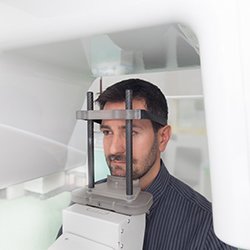
Did you know that implant treatment starts with precise planning? Dr. Kaopua doesn’t approach this procedure blindly; he spends time and effort planning implant placement. We need to know where blood vessels and nerve endings are located to avoid causing problems along the way. Our cone beam CT scanner captures tons of detailed images to create a 3D image of your oral cavity, including oral structures that cannot be shown on X-rays. From this image, we can identify the best way to perform the procedure for optimal results and fewer complications.
Guided Dental Implant Surgery
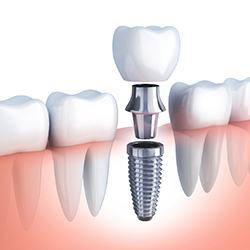
Although Dr. Kaopua performs the implant placement surgery himself in-house and he has years of experience and training, we want to eliminate the potential for human error. In this procedure, the smallest fraction of an inch can make all the difference. As a result, we utilize guided implant surgical technology to execute the placement with precision every time. By using guided technology, we reduce the likelihood of little mistakes, which could accelerate the healing process and increase the chances of successful treatment.
E4D Digital Impression System
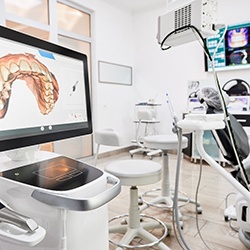
After the implant post has become integrated with the jawbone and the abutment has been placed, we can focus on restoring your dental implant. Traditional impressions entail pressing a putty-like substance firmly against your upper and lower arches for several minutes. Any false move can change how the impressions turn out, potentially leading to an improperly fitting restoration. This messy process is also often uncomfortable for patients. At Albright Family Dental, we want to give you a more pleasant experience and accomplish that through our digital impression system. It’s not only more comfortable to have a small device scan the inside of your mouth, but it also takes accurate measurements, so you’re sure to have restorations that fit the first time.
Dental Implants Post-Op Instructions

After any oral surgery, it’s very important to follow all aftercare steps provided by our office. It’s no different after you receive dental implants. To ensure the smoothest recovery possible and avoid any hiccups in your tooth replacement process, take note of the following tips below. If you have questions, whether it’s about your aftercare or to report symptoms that have you concerned, do not hesitate to get in touch with our team members.
Learn More
What to Do Directly After Dental Implant Surgery

Protecting the blood clot that has formed over your implant is vital to the healing process. It will also help you avoid conditions like dry socket, which can cause major discomfort. This is where the blood clot becomes loose or falls off entirely, compromising the healing of the implant site. Immediately after your surgery, make sure to:
-
Avoid using straws or spitting with force
-
Take it easy – avoid any strenuous activities for the next couple of days
-
Avoid smoking or using any tobacco products
-
Keep your tongue and fingers away from the implant site
Common Side Effects

Mild side effects are normal during the first few days of healing. Here’s how you can mitigate them as you begin the recovery process:
-
Intermittent bleeding – Reduce this with light pressure using a gauze pad as needed.
-
Facial swelling – Cold compresses can help bring down swelling and discomfort. Do not apply to your face for more than an hour at a time.
-
General discomfort – Painkillers (either over-the-counter or prescription) should be taken based on label/doctor recommendations.
Diet

You’ll need to stick to as close to a liquid diet as possible immediately after your surgery. Drinking smoothies (without a straw), and eating applesauce, yogurt, and mashed up bananas are good options. Other foods to consume over the next several days include:
-
Cold/lukewarm soups
-
Mashed potatoes
-
Scrambled eggs
-
Soft-cooked pasta
-
Ice cream
-
Pudding
-
Cold oatmeal
Once you feel ready, you can begin returning to regular foods. Just try to avoid anything tough or crunchy as these can disturb the implant site.
Health & Oral Hygiene

You can (and should) brush your teeth the day after your surgery while making sure to avoid the implant site. Use extreme caution so you do not disturb any of the stitches. To clean the treated area, rinse your mouth with either a prescription oral rinse or saltwater mixture. This should be done two to three times a day. Do not use any mouthwashes that contain alcohol as this can lead to dry mouth.
What to Do After Your New Teeth Are Attached

With the hardest part of your tooth replacement over, you’ll be asked to come back to our office to have your restorations attached! Afterwards, you may notice some minor sensitivity around your gum tissue, but this is normal. Simply take pain medication as needed. You should not have any swelling or bleeding after the restoration is placed.
Maintaining & Caring For Your Dental Implants

Are you aware of proper dental implant care? Once your permanent prosthetics are in place, it’s important that you learn how to maintain them to ensure they last as long as possible. Designed to have a lifespan of 30 years or more, dental implants require regular upkeep to avoid damage and potential failure, which can be caused by gum disease and unhealthy habits. At Albright Family Dental, our team is here to provide helpful tips to make sure you enjoy your smile for a lifetime.
Learn More
Making Oral Hygiene a Priority

Are you brushing, flossing, and rinsing as you should? If not, it’s time to make your oral hygiene a priority. While dental implants in Everett cannot form cavities like regular tooth enamel, they can be negatively affected by nearby decay and gum disease. Brushing twice a day for two minutes, flossing at least once before bed, and rinsing with an ADA-approved mouthwash will help eliminate germs that cause gingivitis and minimize your risk for decay.
Eating a Healthy Diet

Adopting healthy food choices into your daily diet is essential. Having a cookie or piece of pie now and then isn’t too harmful; however, these should not be part of your regular food intake. Otherwise, you run the risk of developing cavities and gum disease. Instead, choose fruits and vegetables that can act as natural toothbrushes. Also, incorporate leafy greens and lean proteins as well as low-fat dairy to strengthen tooth enamel and improve gum health.
Breaking Bad Habits

Unhealthy lifestyle habits can be hard to break. Your implant dentist in Everett understands this, but it doesn’t mean you shouldn’t try. Investing in dental implants is costly, so why continue to practice bad habits that can cause significant damage? Smoking and tobacco use, biting your fingernails, using your teeth as tools, eating ice, and even chewing on pens and pencils when stressed can all lead to a visit to your emergency dental office if you’re not careful. Giving up these habits will ensure your dental implants and natural teeth remain damage-free.
Protecting Your Dental Implants

Not only is giving up bad habits a good idea but talking to your dentist about a customized mouthguard is equally as important. If you play sports or suffer from immense stress that causes you to grind your teeth (bruxism), you need an oral appliance that safeguards your smile from serious injury. A mouthguard designed to comfortably fit inside your mouth will alleviate unnecessary pressure placed on your jaw joints and facial muscles as well as reduce wear and tear to your tooth enamel. It will also absorb the impact should you experience a hard hit, sudden fall, or fly ball that impacts your teeth and gums.
Scheduling Regular Dental Checkups

Regular dental checkups and cleanings every six months are necessary, no matter how many teeth are replaced with dental implants. These visits allow our team to thoroughly check your oral cavity and prosthetics for any signs of decay, disease, or damage. Catching these problems early on will allow us to provide immediate treatment and minimize the potential for implant failure later on. We’ll also make sure you have the information and tips needed to keep your real and artificial teeth in optimal shape, so you can enjoy your full, complete appearance for longer.
Dental Implant FAQs
Can I get dental implants if I have gum disease?
Gum disease is preventable; however, it’s the leading cause of tooth loss. If you’re missing a tooth or two from it, you won’t be a candidate for dental implants until after the infection has been treated. While it adds another step to your plan, it gives your new smile the healthy foundation it needs to thrive for several decades with the right care.
Will I need bone grafting to get dental implants?
Many patients who want dental implants need to have bone grafting before moving forward with their placement surgery. The procedure enhances the thickness of your jawbone to areas that have weakened, such as from prolonged tooth loss. The graft will strengthen your jaw to ensure it can support your dental implant long-term.
Can dental implants fail?
Dental implants are the most reliable option to replace one or more lost teeth. In fact, they have over a 95% success rate. Unfortunately, dental implant failure can occur, but it’s rare. Most often it results from a preventable infection called peri-implantitis. You can safeguard your smile from complications by maintaining your oral hygiene at home and visiting your dentist at least twice a year for a cleaning and checkup.
How much will I pay for dental implants?
There isn’t a set price for dental implants because there are various factors that contribute to the amount you’ll pay, such as the number of teeth you’re treating and if you need any additional procedures. We’ll provide you with an estimate during your consultation and discuss the fees associated with your treatment. In addition, we’ll also take the time to explain your payment options, like using your dental insurance.
Every policy differs, but many plans can be used to help offset your out-of-pocket expense. We’ll work on your behalf with your insurance carrier to file the necessary claim forms, so you have one less thing to worry about. If there’s any remaining balance, our office accepts several payment options to help keep your new smile within your budget.
How can I get started with dental implants?
If you’re ready to replace your lost teeth, your first step is to contact a dentist for a consultation. Don’t Google, “where is a dentist near me?” Instead, take the time to choose someone who is specially trained in the procedure. Our dental team is qualified to complete the entire process in-house, including implant placement surgery. You can rest assured your smile is in good hands when choosing Albright Family Dental.



